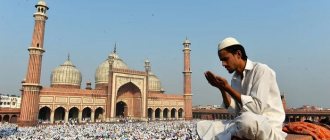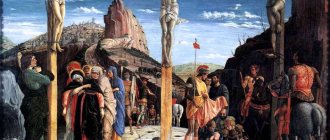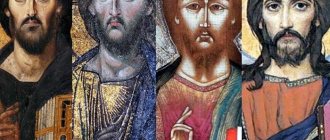Strict monotheism
The epigraph with which this chapter opens is a short creed of Israel. Every morning a pious Jew has been pronouncing these words for three and a half thousand years. The main thing in them is man’s complete devotion to the One God, i.e. The only God who is the guardian and master of Israel. This devotion to God must be expressed not only externally, in a religious cult, but come from the heart, from the very depths of the personality, include both the intellect and emotions, and manifest itself in the zealous fulfillment of the commandments.
Against the background of the surrounding peoples who worship numerous gods of fertility, hero gods, the emperor, and finally, modern idols - wealth, prestige, entertainment, liberally interpreted human rights - against this background, the faith of Israel, which does not allow betrayal of the One God, has always seemed like something amazing.
Judaism and Christianity
Jews have always had a difficult relationship with Christians. Both sides disliked each other, which often led to conflicts and even bloodshed. Today, however, relations between these two Abrahamic religions are gradually improving, although they are still far from ideal. The Jews have a good historical memory and remember Christians as oppressors and persecutors for one and a half thousand years. For their part, Christians blame the Jews for the fact of the crucifixion of Christ and associate all their historical misfortunes with this sin.
Judaism and the world community
Even more surprising will be the list of people professing this religion: Moses, on whose tradition modern Judeo-Christian morality and the tradition of Islam are based, Jesus himself, the Founder of Christianity, great philosophers - Philo of Alexandria, Maimonides, B. Spinoza, M. Buber, famous teachers, for example , J. Korczak, numerous scientists from all branches of knowledge.
However, despite their obvious contribution to world civilization, the Jews were not at all loved by their contemporaries. The famous historian of Russian culture G.P. Fedotov explains the hostility towards Jews by the fact that in Rus' in the Middle Ages there were practically no historiosophical works, but Byzantine sermons were presented in abundance, the favorite technique of which was to blame the evil Jews for the crucifixion of Christ. However, in Rus' and the Russian Empire this dislike never reached the level of hatred that accompanied the Jew in Europe. In Europe, the doors of the craft workshop and scientific laboratory were closed to non-Christians, but the opportunity remained to engage in usury, i.e. lending at interest - a business that the Catholic Church forbade Christians to engage in (profiting from the needs of their brothers in faith is the last thing). It is not surprising that a large amount of capital, often acquired at the expense of the poor, accumulated in the hands of the apparently unproductive Jewish people professing Judaism, which did not at all contribute to the popularity of the Jews. So, lack of education and religious prejudice, as well as a clash of economic interests, led to a clash between other peoples and the Jewish people.
As a result of the numerous catastrophes of Judaism, only two of the twelve tribes of Israel remained. All this raised questions for the Jews about how they could exist, and three solutions were found: 1. accept Christianity (among the famous Jews who converted to Christianity are the Catholic F. Lieberman, founder of the Order of the Holy Spirit, the recently deceased influential Parisian Cardinal J.- M. Lustige, Orthodox priest Father Alexander Men, Protestant movement of Messianic Jews or “Jews for Jesus”), 2. live together within two faiths, but with one culture (M. Mendelssohn), 3. separate from the goyim (non-Jews) , go to the Promised Land and revive Israel there (this movement was called Zionism, a prominent ideologist - T. Herzl). However, none of these decisions, as we know from history, saved the Jews from the Holocaust.
Nevertheless, Judaism still exists, and the great ethnic groups, many times superior to the Jewish one in cultural and military terms, have sunk into oblivion (such is the fate of Egypt and Babylon, Rome, and the Rus, who originally inhabited our lands). The question arises: how did the people neighboring these great civilizations end up with such a fruitful history, how did they even survive? The Jews themselves explain this by the direct intervention of God in history, and we can learn about this in the holy books of Judaism.
The Birth of Judaism
The veneration of Yahweh by the first descendants of Abraham was not yet, in fact, Judaism or even monotheism in the strict sense of the word. In fact, the gods of the biblical religion of the Jews are numerous. What distinguished the Jews from other pagans was their reluctance to worship any other gods (but, unlike monotheism, they recognized their existence), as well as a ban on religious images. Much later than the time of Abraham, when his descendants had already multiplied to the size of an entire nation, and Judaism took shape as such. This is briefly described in the Torah.
As fate would have it, the Jewish people fell into slavery to the Egyptian pharaohs, most of whom treated them rather poorly. To free his chosen ones, God called a new prophet - Moses, who, being a Jew, was raised at the royal court. After performing a series of miracles known as the Plagues of Egypt, Moses led the Jews into the desert to lead them to the Promised Land. During this sojourn on Mount Sinai, Moses received the first commandments and other instructions concerning the organization and practice of the cult. This is how the formalized faith of the Jews arose - Judaism.
Holy books of Judaism
The main book of Judaism is the TaNakh, which includes the Torah (Pentateuch of Moses), Neviim (Prophets), Ketuvim (Scriptures). This body in the Christian Bible was called the Old Testament. The most ancient parts of the Tanakh include legends coming from Moses (XV century BC), the latest texts date back to the IV century. BC. From this book you can learn about the creation of the world, the Fall, and the history of Israel under the leadership of God. Here there are commandments that are obligatory for a devout Jew to follow, and the teachings of the wise, which help to rationally organize one’s life.
The Tanakh is written in the ancient Hebrew language, Biblical Hebrew, which is considered sacred and wonderfully designed. For example, the word “truth”, emet, one of the basic concepts of any religion or philosophical system, is expressed in Hebrew by the first, middle and last letter of the alphabet (the order of writing in Hebrew is from right to left).
The Tanakh is considered so precise that even a small letter in it is not without meaning, and often to understand the text it is important to grasp precisely the shades of meaning. So, in the book. Exodus, chapter 15, tells how Israel, having just been saved by God, grumbled at the moment of testing, and Moses cried out to God. As interpreters say, here we see two main reactions to difficulties: internally unfree people, yesterday’s slaves, grumble and look for someone to blame, while free people, strong in spirit, like Moses, turn to God with a prayer. What would we do in a difficult situation?
Second Temple
The temple was a national symbol for the Jews, a banner of unity, fortitude and a physical guarantor of divine protection. When the temple was destroyed and the Jews were taken into captivity for 70 years, Israel's faith was shaken. Many began to worship pagan idols again, and the people were threatened with dissolution among other tribes. But there were also zealous supporters of paternal traditions who advocated for the preservation of former religious traditions and social structure. When in 516 the Jews were able to return to their native lands and restore the temple, this group of enthusiasts led the process of reviving Israeli statehood. The temple was restored, services and sacrifices began to be held again, and along the way, the religion of the Jews itself acquired a new face: the Holy Scriptures were codified, many customs were streamlined, and an official doctrine was formed. Over time, several denominations arose among the Jews, differing in their doctrinal and ethical views. Nevertheless, their spiritual and political unity was ensured by a common temple and worship. The era of the second temple lasted until 70 AD. e.
Currents in Judaism
Along with the written Law-Torah, Prophets and Scriptures, there was also oral tradition, which eventually took shape in the Talmud. In this book, or rather, a voluminous collection of various treatises, we encounter learned debates of the sages about the best implementation of the Law. For example, when studying how much to donate to poverty, the Talmud does not determine the exact amount, saying: how much your heart does not mind. There are funny stories in the Talmud, for example, about a man who was very worried because he could not fulfill the commandment to leave forgotten sheaves for the poor, because he had an excellent memory. And when he finally forgets the sheaf, he throws a big feast - today he managed to fulfill another commandment of God! However, along with this, in the tradition there was also something that was not at all similar to the Revelation of God, for example, petty regulation of what cannot be done on the Sabbath, discussions about how to circumvent some of the rules of the law and at the same time remain formally pure, in which the Pharisees, predecessors Talmudists, Jesus Christ reproached.
In the Middle Ages, the mystical teaching of Judaism, or Kabbalah, actively developed. In order to understand it, it is necessary to master a special esoteric language and learn from a cabalist mentor. The independent researcher is struck by how complex the Kabbalah appears compared to the Tanakh. If the Talmud sometimes resembles a dry collection of court rulings, then the Kabbalah is a Gnostic version of the presentation of the Jewish faith.
As if in response to these deviations into scholarship and mysticism in the 18th and 19th centuries. In the countries of Eastern Europe, in Lithuania, Ukraine and Belarus, a movement of Hasidim, ordinary people thirsting to live in the truth of God, appears. They study utsadikim, righteous people who teach the simplest and most direct way of fulfilling the Torah. This movement also became popular in non-Jewish intellectual circles thanks to the brilliant presentation of it in the form of parables and life stories by the outstanding twentieth-century philosopher Martin Buber, thanks to the lively nature of this tradition, with dancing, laughter and rejection of the extremes of asceticism. The Hasidic God is not only the Lord and Father of the people, but also the loving Father of a particular person; and in this the Hasidim are close to the Christian understanding of God.
The Israeli Constitution does not recognize any religion as official.
The State of Israel was founded as a “national home” for all Jewish people, which is why, according to the Law of Return, the State of Israel grants the right of citizenship to all Jews, children of Jews and grandchildren of Jews to receive Israeli citizenship.
The exception is for halakhic Jews who have converted to a religion other than Judaism, as they are not eligible for repatriation.
Excerpt from the original Israeli Declaration of Independence. This document establishes guarantees of freedom of religion for all residents of the country.
The Constitution of the State of Israel states that it is a democratic state and here other ethnic and religious groups have equal legal rights, along with Jews. That is why it cannot be said that Jews preach as an official religion, especially since religion in the country is separated from the state.
At the same time, the majority of the country's population supports Judaism and, in one form or another, preserves the specific character of Israeli statehood and society.
Judaism is the religion of the Jews, although there is no official religion in the country.
Freedom of religion in Israel is guaranteed by the Declaration of Independence, but the state and religion are not completely separated from each other, since in the field of family law and some other areas there is religious law enshrined in laws adopted by the Knesset.
The absence of an official religion, as it were, equalizes all religious groups in the country in their rights, with the dominance of Judaism. Even during the British Mandate, such a situation arose and the Israeli authorities diligently maintain interreligious peace in the country.
Faith of the forefather Abraham
However, when the first believer of this new religion, Abraham (XVIII century BC), met God, he did not yet imagine what the One would be like who would take Abraham himself and his descendants under his protection.
You can read about Abraham's calling in the book of Genesis, chapter 12. God requires him to leave his father’s land and go to the land that God Himself will indicate. Now it’s easy for us to buy a plane ticket and move to another country - we will still be protected by the law. In an ancient patriarchal society, a person who left his relatives found himself completely defenseless. God expects great trust from Abraham, to rely on God in everything.
But faith is not a one-time act. It requires constancy and loyalty . And to prove his devotion, God later (chapter 22) demanded that Abraham sacrifice his own son, and only at the last moment intervened, replacing his son with a sacrificial lamb. On the one hand, God thus clearly showed Abraham that He does not accept human sacrifices from neighboring nations, on the other hand, how serious it is to believe and communicate with the Almighty; faith is a thin bridge between life and death.
Rituals and holy religious places
Jews pray in synagogues. Traditionally, in the synagogue, men sit in front of women, women behind men, or behind a separate partition or on the balcony. There are a number of places in Jerusalem, in Israel, designated for faith, confession, which have religious significance for Jews, Muslims and Christians.
Dome Rock is an ancient Muslim temple. Christians often make pilgrimages to the Church of the Holy Sepulcher, which is also located in Jerusalem. The Western Wall, the remains of the Jewish Temple destroyed by the Romans in 70 AD, is a sacred site for Jews. There is a separate section of the wall for men and women. Religious people often write their prayers and requests on scraps of paper and place them in the cracks between the stones.
The Jewish New Year, called Rosh Hashanah, falls in September or October. Jews come to the synagogue for two days and listen to Torah readings there. The Jewish holy mountain, called the Temple Mount, is located in the southeastern part of the old neighborhood in Jerusalem.
And today, understanding what kind of religion the Jews have in Israel, it is not surprising that religious Jews all over the world, when saying prayers, turn their faces to Israel; Jews in Israel face Jerusalem, and Jews in Jerusalem face the Temple Mount. Prophecies say that Moshiach (Messiah) will build the last, Third Temple on the Temple Mount, which will become a great center for the Jews and all humanity.
The Last Judgment at the end of time will take place on the slopes of the Temple Mount. Golgotha is a sacred place for Christians. Golgotha, or Bald Mountain, is the name given to the small rock or hill where the crucifixion of Christ took place.
Golgotha is one of the two most important shrines of Christianity, along with the Holy Sepulcher. At the beginning of the 1st century AD, that is, at the time of Christ, Golgotha was located outside the city walls of Jerusalem, northwest of the city. Today it is located in the Church of the Holy Sepulchre.
Covenant: Land, Seeds, and the Promise of the Messiah
So, God, in whose presence Abraham is seized with sacred awe and horror, enters into a Covenant with him, i.e. contract Because the forefather followed His call, Abraham is promised land and numerous descendants.
It was this land that later received the name of the Promised Land, Eretz Israel, to which every Jew strives so much and which he would never give up to anyone else - precisely because this land is God’s promise.
Even more amazing aspirations are associated with offspring. Jews believe that it is in the descendants of Abraham that the Mashiach, (Messiah or Christ in Greek), the Anointed of God, an amazing king, priest and prophet, should appear, with whose arrival the world will change, the Kingdom of God will come. Some politically engaged Jews believe that with the coming of the Messiah, the Jews will rule the world, while others hope that the coming world of the Messiah will be qualitatively different - violence and even death will disappear in it, the lion will sleep with the lamb, and the light will never go down. Until now, every morning pious Jews open the window to see if the air has changed, if the Messiah has come. Some zealots of Judaism believed that the coming of the Messiah could be hastened by provoking God's intervention - for example, by rebelling against the oppressors: the worse it is for us, the faster He will come. However, the uprising against Rome in the 70s. AD did not lead to the expected result, but ended in the complete destruction of Jerusalem and the Temple, of which the Temple Wall, the so-called, now serves as a reminder. The Western Wall, one of the main shrines of Judaism.
What does the Bible say about Jews and Jews?
The Bible says that the Jews are the chosen people, who were supposed to be the beginning of faith in one true Creator. The Lord first appeared to Abraham, who had a son Isaac, and he had a son Jacob. It was Jacob who gave birth to 12 sons, who became the basis of the multi-million Jewish people. But one of the 12 sons, Joseph, achieved enormous success and became the pride of his father. Therefore, the other sons decided to kill their brother. But Judah (one of 12 sons) suggested that the brothers sell Joseph into slavery. Later, God helped Joseph and he was transported to Egypt, where he achieved fame with Pharaoh. He took all his brothers, who were expelled, and for about 500 years the Jewish people lived in Egypt and flourished.
But later a Pharaoh appeared in Egypt and expelled the Jews from his land. These people wandered for some time. God sent prophets to the people to guide them on the right path; the final punishment was 40 years of wandering in the desert. Later, God allowed the choice of a king at the request of the Jews, so that it would be easier for the Lord to rule. But among the kings there was Solomon, who did not worship one God, but was a pagan. After the death of Solomon, the Jewish people were divided. Ten tribes became the inhabitants of Israel, and Judah (heirs of Judah) and the tribe of Benjamin created Judah, the southern Jewish state.
Later, the southern and northern kingdoms of the Jews were wiped out by Assyria and Babylon. The Jews themselves were captured and transported to Babylon. Only 70 years later they were allowed to return to their historical homeland and revive their temple. Then came the revival of the Jewish people.
Jews near the Western Wall
Image of God
What is He, the God of the Jews? We have already seen that in the Torah He is described as One , i.e. The only one, and besides him there is no god. He is the Creator and Ruler King He rules the world, judges It, and in Judgment , truth and justice are balanced by mercy and compassion. In His presence, experienced as a radiance of glory, a person is seized with sacred horror and awe.
The Name of God in Judaism is considered so holy that it is not pronounced by anyone except the High Priest, and he could pronounce the Name only once a year, while in the Holy of Holies of the Temple. This is due to the fact that, as all religions know, not a single spoken word is in vain: when a person, for example, swears, he calls a curse on the head of another (all magic is built on this), and when he pronounces the Name of God, he calls God Himself. This name, consisting of the letters yod-he-vav-he (in the Russian Bible rendered as Yahweh, or Jehovah), is difficult to translate into other languages, and it means the One who was, is and will be, the One who has true being, is the source of all life. The Russian equivalent of this name is Existing.
Who is the founder of Judaism?
Judaism is the oldest religion of the Jewish people, the founder of which is considered to be Moses. He succeeded in creating a single people from the disparate tribes of Israel. In addition, he is known for having planned and carried out the departure from Egypt of the Jews who lived there as slaves. At that time, the Jewish population increased greatly, and the Egyptian ruler ordered all born boys of Jewish nationality to be killed. The future prophet survived thanks to his mother, who, placing the newborn baby in a wicker basket, sent her sailing along the Nile. Soon the basket was discovered by the pharaoh's daughter, who adopted the found boy.
Judaism
Growing up, Moses constantly noticed the oppression that his fellow tribesmen were subjected to. In a fit of rage, he once killed an Egyptian overseer and had to flee the country. The land of Midian sheltered him. He lived in a semi-nomadic city mentioned in the Bible and Koran. It was there that God, in the form of a flaming but fireproof bush, called him to himself. He told Moses about his mission.
The Torah, also called the Mosaic Pentateuch, is the holy book of the Jews. Its text is quite difficult for ordinary understanding. Theosophists and theologians have been creating commentaries on the main Jewish book for thousands of years.
Human
In Judaism, images of God are prohibited - it must take a lifetime to create a true image of God in oneself. This is possible because man is a reflection of the Creator, His image in our world.
Like God, man has a creative beginning . We are accustomed to the fact that we associate creativity mainly with the sphere of art, but in the ideas of Judaism, any task, including washing floors, can be creativity if a person devotes himself to it with all his heart.
Like God, man is free, and he cannot justify his sinful acts by heredity, upbringing or circumstances; on the contrary, he must use his freedom to serve the Creator, to correct the world, realizing truth and justice.
Freedom in Judaism also implies freedom from external slavery: in Judaism there was no attitude towards slaves (and especially hired workers) as “human material”: a slave is a member of the family, he could inherit the property of his master and had the opportunity to regain his status an ordinary citizen at God's appointed time. The greatest hymn to freedom in all of human history is the celebration of deliverance from Egyptian captivity, which was carried out by God Himself through the hand of Moses. This event later became a symbol of the struggle for their rights among the black population of America (it is no coincidence that L. Armstrong’s anthem “Moses” (Let My people go)).
Man is made lord, ruler over Awareness of this could really change the ecology, man's attitude towards the world around him.
However, from the second chapter of the book of Genesis we see that man cannot be content with communication with animals and nature; even communication with the One God is not enough for him: “It is not good for man to be alone.” For a full life you need another person. Man was created to communicate with his own kind . An assistant corresponding to a person - not lower or higher, just possessing other gifts that men do not have. This is how a woman appears. The union of a man and a woman is described as “one flesh.” This is not just a symbol of carnal intercourse, about which it is said “Adam knew Eve his wife, and she conceived.” Here the idea is larger and deeper: ideally, marriage should be characterized by complete unity - physical, mental and spiritual.
What is the essence of Judaism?
People who profess Judaism are Jews. Some followers of this religion are sure that it appeared in Palestine - back in the period of Adam and Eve. Others insist that Judaism was founded by a small group of nomads, one of whom, Abraham, made a pact with God that later became the main tenet of the religion.
According to this document, better known to everyone as the commandments, people had to observe all the rules of a decent life. For this they received divine protection. The main sources for studying this religion are the Bible and the Old Testament. Judaism recognizes only historical, prophetic types of books and the Torah - narratives that interpret the law. In addition, the sacred Talmud, which consists of the Gemara and the Mishnah, is especially revered. It covers many aspects of life such as ethics, morals and law. Reading the Talmud is a sacred and responsible mission that only Jews are allowed to perform. It is believed to have great power, just like mantras.
Torah
Silence is needed for the word to ripen. Prayer is needed for the word to be born. If it were to appear in the bustle, its depth would be lost.
To govern this world and the entire Universe, the Almighty created the Torah, the law. Some teachers of Judaism say that the Torah preceded the creation of our world, and in this sense the Torah is similar to the Logos of the Stoics or the Dharma of the Buddhists. For people, the Torah is given in the form of the Pentateuch of Moses, which is the duty of every Jew from the age of seven to study, and teaching a child the Torah is the main responsibility of the father in the family. However, there is one important clarification. Studying and following the law is difficult, but possible. However, for God, it is more important to listen to His voice, which is infinitely more difficult: “If you will only listen to the voice of the Lord your God, and be diligent to do all these commandments that I am commanding you today...” (Deut. 15:5) Only the search for a living voice God's prayer helps us understand how to correctly fulfill everything written in the Law.
Commandments
The Law of the Most High is expressed in the form of commandments, mitzvot. The commandments, which are written in the Torah and discussed in the Talmud, represent the lower limit, by crossing which a person reduces the amount of life in the world. Thus, the “tit for tat” rule was established precisely to limit vindictiveness, in order to avoid causing more damage. However, if we are talking about relationships in the family, another, higher principle must operate here - a virtuous wife repays her husband with good, and not evil, all the days of her life (book of Proverbs of Solomon, chapter 31).
The basic commandments of Judaism were given after the deliverance from Egyptian captivity (XV century BC) by the hand of Moses, and are recorded in the book of Exodus, chapter 20:
- And God spoke all these words, saying:
- I am the Lord your God, who brought you out of the land of Egypt, out of the house of slavery;
- Let you have no other gods before Me.
- You shall not make for yourself an idol or any likeness of anything that is in heaven above, or that is on the earth below, or that is in the water under the earth;
- You shall not bow down to them or serve them, for I am the Lord your God, a jealous God, visiting the iniquity of the fathers on the children to the third and fourth [generation] of those who hate Me,
- and showing mercy to a thousand generations of those who love Me and keep My commandments.
- Do not take the name of the Lord your God in vain, for the Lord will not leave without punishment the one who takes His name in vain.
- Remember the Sabbath day to keep it holy;
- work for six days and do all your work,
- and the seventh day is the Sabbath of the Lord thy God: on it thou shalt not do any work, neither thou, nor thy son, nor thy daughter, nor thy manservant, nor thy maidservant, nor thy cattle, nor the stranger that is within thy gates;
- For in six days the Lord created heaven and earth, the sea and everything in them, and rested on the seventh day; Therefore the Lord blessed the Sabbath day and sanctified it.
- Honor your father and your mother, so that your days may be long in the land that the Lord your God is giving you.
- Dont kill.
- Don't commit adultery.
- Don't steal.
- Do not bear false witness against your neighbor.
- Thou shalt not covet thy neighbor's house; You shall not covet your neighbor’s wife, nor his male servant, nor his maidservant, nor his ox, nor his donkey, nor anything that is your neighbor’s.
What do these commandments say? Above we examined the commandment about the veneration of the One God, the prohibition of images and the use of the Name in vain.
The Sabbath commandment establishes that it is necessary to actively work for six days of the week, and then devote one day to rest and communication with the Creator. Most people today do not find time to stop from the frantic pace of life and ask themselves the question: “Where am I?” (cf. Gen. 3:9) Why do I live, what does everything that happens to me mean? Maybe I lost the direction in which to move a long time ago, or I never even knew it, and lived guided by other people’s guidelines? What place does God and communication with Him occupy in my life? How do I keep His commandments? The Sabbath, which the Jews celebrate as a real family holiday, should remind a person of such issues.
The commandment to honor parents is the very first commandment concerning relationships with people. This is precisely a commandment, not a good wish. It assumes that a person is obliged: 1) to honor his parents (not to slander, but to bless), no matter how they behave, not to insult them, 2) to obey them in everything that does not contradict the Law of God, 3) to take care of them in old age. This commandment is accompanied by a promise: “that your days may be long, and that it may go well with you in the land which the Lord your God is giving you” (Deuteronomy 5:16). Modern psychotherapists are well aware of how important relationships with parents are, they know how a person suffers if there is no peace in his heart with his parents, and they see how unresolved conflicts with elders subsequently affect relationships with children.
Apparently, we all understand the commandment about the inadmissibility of murder. It follows from the fact that man is the Image of God. “When you kill a person, you destroy the whole world,” say teachers of Judaism.
However, the commandment against adultery is much less clear today. At the same time, it is the sphere of sexual relations that is the area in which the Judeo-Christian tradition made a real revolution. In fact, with this commandment, God tells the believer: “You must not use another person just as a thing for pleasure. Your relationship can be much deeper, it can be a communication between two individuals, a covenant relationship. Like your relationship with Me, marriage is indissoluble. You and your wife are made for each other. I created you to help each other move toward holiness. The offspring that you will have is an increase in life, this is your participation in My Creation.” Marriage in Judaism is called kiddushin, sanctification, and an unmarried man or woman cannot be considered a full-fledged Jew, since they do not fulfill the very first commandment of the Torah: “Be fruitful and multiply” (Gen. 1:28).
The commandment against false oaths is associated with ancient legal proceedings, in which a person could be convicted only if there were two witnesses who were the first to carry out the sentence (for example, by throwing stones at the person). Today, due to the impersonality of the judicial process, this commandment is more difficult to fulfill, but this does not relieve responsibility from those who participate in litigation, proceedings at work, at home, and administer justice.
The commandment about the prohibition of theft, including from the state, as well as the commandment about the inadmissibility of envy, in its positive aspect, call to be grateful to God for what a person has. An envious person who is always lacking something cannot be truly happy. A true relationship with God in Judaism is characterized by gratitude.
The commandments, as we can see, are not prohibitions given by God on a whim, but boundaries that help a person maintain and increase life. In the center of a busy Western city there was a kindergarten, where the management decided to replace the solid solid fence with transparent panels through which one could see the flow of cars rushing in different directions. The children simply stopped going outside - they were afraid because the fence was not visible. In the same way, psychotherapists know cases where raising children in a spirit of permissiveness led the latter to suicide attempts, because they did not feel the boundaries of their personal space in the family and did not know what to rely on in a difficult situation. The commandments of the Law are precisely such a “fence” of life in Judaism.
Judaism and Islam
Speaking about the relationship of Islam to Judaism, it is necessary, firstly, to note that Muslims also consider themselves children of Abraham, although not from Isaac. Secondly, the Jews are considered the people of the book and the bearers of divine revelation, albeit outdated from the Muslim point of view. Reflecting on what kind of faith the Jews have, adherents of Islam recognize the fact of worshiping the same god. Thirdly, the historical relationship between Jews and Muslims has always been ambiguous and requires separate analysis. The important thing is that in the field of theory they have a lot in common.
Sin
Breaking a commandment is called sin. The Greek word for sin, 'amartia, literally means "missing the mark." But this is not a harmless mistake. Sin is emptiness, a place where there is no God, which means death. It is a spreading hole in existence. Sin binds the one who committed it, deprives him of freedom (hence the expressions “bonds of sin”, “yoke of sin”). In the tragic story described in the 2nd book of Kings (chap. 11 ff.), we see how King David (10th century BC), who desired another man’s wife, commits adultery, goes to kill her husband, and then does not is able to punish the son of Amnon, who repeats his father’s sin, which prompts another son, Absalom, to kill his brother and discord with his father, and this ultimately plunges the country into civil war. We see that sin here is not only guilt, but also a disease, a misfortune. Later in the Christian tradition, the sinful orientation ingrained in the individual will be called passion, from the word suffering. Sin makes you suffer. He, like a boomerang, hits the one who introduced him into the world. The only way to stop sin is to eradicate its cause. However, if every sin committed were punished, there would not be a single person left on earth.
First Temple
While on Sinai, Moses, among other revelations, received from the Almighty guidance on the construction of the Tabernacle of the Covenant - a portable temple intended for making sacrifices and performing other religious rites. When the years of wandering in the desert ended, the Jews entered the promised land and established their statehood in its vastness, King David set out to replace the tabernacle with a full-fledged stone temple. God, however, did not approve of David's enthusiasm, and entrusted the mission of building a new sanctuary to his son Solomon. Solomon, having become king, began to fulfill the divine command and built an impressive temple on one of the hills of Jerusalem. According to tradition, this temple stood for 410 years until it was destroyed by the Babylonians in 586.
Sacrifices
Repentance and sacrifices are established as a ransom from death for sin. Sacrifices are not made in Israel now, because there is no place where to make them - there is no Temple. However, in ancient times, sacrifices were very plentiful. A legend has been preserved that during the Passover holiday, Jerusalem priests walked ankle-deep in blood, and the fire from the altar was visible in neighboring cities. Moreover, they donated not ordinary animals. Usually it was a lamb or a kid, the best of the breed, which the owner chose from birth, fattened on the best pastures, it was the favorite and best animal. Sacrificial murder was a very clear reminder of what sin is: “The best thing I have is in my place.” Cruel? Maybe. But Judaism says the world has not always been like this. It was originally conceived differently.
Creation and Fall
The first chapter of the book of Genesis tells us how the world was designed. We see that there is no death, that after each day of Creation it is stated: “And God saw that it was good.”
Only the disobedience of the first man, Adam, described in the third chapter of Genesis, changed this situation. This story is the archetype of all human failures. First, the temptation appears, which is to violate the will of the Creator (to go against conscience, which is the voice of God in man, against authority) - v. 1. But a person agrees to this because the temptation a) looks innocent (pleasant to the eye) b) gives pleasure when thinking about it (lustful) b) puts him above others, gives him a reason for pride (gives knowledge) - v. 6. These are all universal motives for committing sin. After committing a sin, a person feels shame, guilt and fear, and runs away from communication - v. 7–10. Instead of repentance and correction, he is inclined to shift responsibility to another - v. 12.
In the further narrative (chapters 4–11) we see murder out of envy (the story of Cain and Abel), the emergence of polygamy and revenge (Lamech), occultism (the story of the union of the daughters of men with the sons of God), and atheistic humanism (the story of the Tower of Babel).
This is the beginning of human history, and God will have to work with such people in the future, to make a holy people out of them.
In addition to Jews, Christians and Muslims live in Israel
When answering the question: what kind of God does the Jews have, it is necessary to remember that Christians and Muslims also live in the country. Therefore, the second religion after Judaism will be Christian or Muslim. There are 150-200 thousand Christians in the country.
150 - 200 thousand
There are about that many Christians in Israel, most of them Catholics
In 2000, there were 197 Christian churches and places of worship operating in Israel, belonging to 72 different Christian denominations.
Basilica of the Annunciation, Nazareth. Catholics make up the majority of Israeli Christians. Photo: upload.wikimedia.org
In the country you can meet representatives of all Christian denominations. Catholics, however, make up the overwhelming majority. Most of them are Uniates. In total, as of 2010, there were 90,000 Catholics in Israel.
There are approximately 150 - 200 thousand Christians living in Israel, most of them Catholics.
There are approximately 30,000 Orthodox and ancient Eastern Church believers living in Israel.
30 thousand
there are so many Orthodox and believers of ancient Eastern churches in Israel
At the same time, Israeli Orthodoxy is represented by the Jerusalem Orthodox Church. Officially it is called the Patriarchate of Jerusalem or the Greek Orthodox Patriarchate of Jerusalem.
This is the oldest autocephalous local Orthodox church. It occupies 4th place in the diptych of autocephalous churches and is governed by the Patriarch of Jerusalem and the Holy Synod. Protestants are also present here. These are Anglicans, Lutherans, Presbyterians, Adventists, Baptists, Holiness Movement supporters, Jehovah's Witnesses, Mormons, etc.
Al-Aqsa Mosque in Jerusalem. In the territory of the State of Israel, Islam is considered the most popular religion. Photo: upload.wikimedia.org
For Muslims, Jerusalem is considered the third most important holy city after Mecca and Medina. This is why Islam is considered the second largest religion in Israel. Moreover, from the 8th century to the mid-early 20th century, Islam prevailed in the country.
This was due to the Arab conquest of the country. Modern Muslims in the state are represented mainly by Israeli Arabs. As of 2016, their number is 16.8% of the country's population.
Holiness
The concept of holiness in the Torah is not identical to holiness in Christianity. If in the Christian tradition a saint is a person filled with the Holy Spirit, an internally transformed person, then in Judaism holiness is separation. The lamb that was sacrificed for sin was called kadosh, holy. In order to teach a person to separate good from evil on a purely everyday level, to instill in the minds the very idea of holiness, God establishes the laws of kashrut. Thus, you cannot mix meat and dairy foods, sow a field with two types of seeds, cross-breed animals of different species, or make clothes from different materials. By observing them, for example, eating the right food with a blessing prayer, a person sanctifies creation and brings it to the Creator; by neglecting these rules, he lowers his level and the level of everything he touches.
Today, holiness in this sense is possessed by a person who finds the strength not to be like everyone else, like the crowd, but to defend the truth, to act according to conscience and the law of God, even if he has to fight alone.
Religious values of Judaism
Speaking about Jewish spirituality, it can be argued that Judaism is a religion briefly characterized as a cult of traditions. In fact, traditions, even the most insignificant ones, are of great importance in Judaism, and severe punishment is imposed for their violation.
The most important of these traditions is the custom of circumcision, without which a Jew cannot be considered a full-fledged representative of his people. Circumcision is done as a sign of the Covenant between the chosen people and Yahweh.
Another important feature of the Jewish way of life is strict observance of the Sabbath. The Sabbath day is endowed with extreme holiness: any work is prohibited, even the simplest, like cooking. Also, on Saturday you cannot just have fun - this day is reserved only for peace and spiritual exercises.
Cult, holidays and life
A cult has been established to communicate with God. Historically, the cult of Judaism has changed: first, altars were built in various places, then sacrifices were made near the portable Ark of the Covenant, finally, the cult was centralized around the Temple in Jerusalem, and after the destruction of the Temple, sacrifices were canceled, and only verbal prayer remained as the main form of worship.
Every pious Jew today is obliged to read prayers three times a day - to bless upcoming affairs, to sum up the results of the working day and remind him of the Creator, to prepare for bed. Prayers include blessings and psalms. The tone of the main prayers is joyful and life-affirming, because in Judaism joy is considered the main value of life. At the same time, this is not naive optimism or artificially induced emotional states. The Jew knows well that “Even with laughter [sometimes] the heart hurts, and the end of joy is sorrow” (Proverbs 14:13). The joy of the Jew is based on faith in the promises of God.
At the same time, Judaism also knows the mournful time of fasting. Fasts in Judaism are short, but complete (you should not only not eat, but also not drink). Fasting is a sign of repentance for one's sins. Every year there is a national fast on Yom Kippur, the day of purification. In ancient times, on this day, a special “scapegoat” was chosen, onto whom all the sins of Israel, including unconscious ones, were transferred, and he was released into the desert; today he is thrown from the top of the mountain.
The main holidays of Judaism are Passover, reminiscent of the liberation from Egyptian captivity, Sukkot, the festival of booths, reminiscent of the wilderness journey, and Shavuot, the festival of first fruits and the making of the Covenant. A well-known holiday in which non-Jews often participate is Hanukkah. This holiday is associated with a miracle when a small bottle of consecrated oil was enough for the Temple lamp for seven whole days. Today, in memory of this miracle, the seven-branched menorah is lit.
Judaism has its own calendar, going back to the creation of the world. Every seventh year in ancient times it was necessary to give rest to the entire earth, thereby testing the people’s trust in the Creator, because He promised to feed His people. Every seventh of these years, i.e. The forty-ninth year was called the Year of Jubilee - at this time all debts to fellow tribesmen were forgiven, all property leased was returned.
The main rites of Judaism are: circumcision in infancy (a symbol of dedication to God), bar mitzvah at thirteen (the boy reads the Torah in the synagogue, indicating that he has reached adulthood and can be responsible for himself), marriage (see above), teshuvah or mourning for the deceased (ten days of complete mourning, during which you cannot even wash your face or cook food - however, you cannot grieve for more than this time).
The main place where the religious life of a Jew takes place is the family. It is the spiritual well-being of the family, the peace in it that should be the main concern of the Jew; only after the family comes the community, which gathers in the synagogue for communication and joint prayer. Special religious education can be obtained at a secondary specialized school - yeshiva, or at a university.
Halakha is an integral part of the legal system of the State of Israel
The religious tradition has been maintained in Israel for thousands of years. That is why Judaism penetrates into all spheres of life in the country. For example, halakha is an integral part of the Israeli legal system. An example of this is the field of family law, namely the institutions of marriage and divorce with related issues.
Jewish Christians
All of them are under the jurisdiction of religious courts in accordance with the law of the Mandate era. In addition, according to laws passed by the Knesset, the authority over matters of personal status of Israeli citizens depends on their religious affiliation.
This provision directly concerns municipalities and village councils in the country. The councils have religious courts that resolve most disputes regarding personal civil status.
The Israeli Supreme Court building in Jerusalem. Secular issues of law in Israel are resolved by a system of secular courts, headed by the Supreme Court. Photo: upload.wikimedia.org
The religious right is dominant in Israel. For example, the Old Testament is used in the activities of religious courts, the same applies to the Talmud and the Torah.
In addition, it is impossible to marry in the country if it is not recognized by one of the four main faiths. Non-believers and non-commandment Jews according to Halakha can marry according to Jewish religious law.
A separate ministry has been created to control religious institutions in Israel.
The Ministry of Religious Affairs in Israel has existed since the founding of the State of Israel. Its task is to exercise control over the activities of religious institutions.
Religious courts (Jewish, Muslim, Druze and Christian) have jurisdiction over civil status issues, family law issues, and burials. The jurisdiction of rabbinical courts also includes the approval of conversion.
District Rabbinical Court building in Tel Aviv. The approval of conversion, that is, (the conversion of a non-Jew to Judaism), is in the field of their activity. Photo: upload.wikimedia.org
Israeli rabbinate courts approve conversion, that is, the conversion of a non-Jew to Judaism. Legal scholars say at the same time that Halakha is not identical to the legal system of the Israeli state.
This is manifested in the fact that when the court needs to make a decision on any issue, first of all, the search for a solution is carried out among the laws of the State of Israel, then among the laws of the British Mandate, and lastly, among Jewish primary sources (Talmud, Halacha, etc.). d.).
Prophets in Judaism
Prophets in Judaism are not psychics or predictors of the future. Prophecy is looking at history from God's point of view. Such a view can be turned to the past (tales about the creation of the world), to the present (evaluation of modern events) and to the future (God's promises).
As mentioned above, it is important for a real Israeli not only to fulfill the commandments, but also to obey the voice of the Lord and to be in living communion with Him. Often in the history of a people, written from a prophetic perspective, the prince of small Judea will be given several times more attention than the king of all Israel - simply because the first fulfilled the will of God, and the second ignored it in every possible way, and ended up in the sacred chronicles solely for the sake of reminders of how not to behave.
However, the history of Israel shows that people still forget about the One who is most important, and then religious life is reduced to everyday life, to rituals, sacred rites, holidays, disputes about the Law, which cease to remind of the Living God, and become important in themselves. And it happens that direct betrayal occurs, and the people go “to commit fornication after other gods.”
God hates any betrayal of Himself. Through chosen people, prophets, He proclaims punishments for the people who betrayed the Covenant, promises punishment in the form of stupid rulers, famine, captivity, etc. All this is dramatically fulfilled in the history of Israel.
But, having punished, He also heals, promising deliverance and giving hope for the coming of the Messiah.
Religious practices in Israel
To know what religion is professed in Israel, let's talk about its manifestations.
Rabbis are the religious leaders of the Jewish community. They are ordained in Jewish law, and often these people are scholars in addition to their responsibility to give sermons and offer spiritual guidance. The Chief Rabbinate is the body of rabbis who preach the religious laws to which Israeli Jews strictly obey.
The main religious figures of the Muslim community are the muezzins, who know the scriptures of the Koran and can carry out the call to prayer at the mosque.
Self-test questions
- Name a few prominent representatives of Judaism.
- How was Judaism fundamentally different from the beliefs of other peoples at the time of its inception?
- On what issue does Judaism differ from Christianity?
- Name the main trends in Jewish thought and characterize them.
- What is faith according to the Torah?
- What does it mean when it says that man is created in the image of God?
- List the 10 commandments given through Moses to Israel. What does each of them mean?
- Why were sacrifices needed in ancient times?
- What is the difference between the prophets of Israel and modern psychics or astrologers?
- What does it mean to be holy in the context of the Tanakh?
Notes:
In the transcription of names and titles of books of the Bible, in quotations, we will adhere to the more common Christian tradition to facilitate search and memorization.
A Jew is a definition of a person based on religion, while a Jew is defined based on nationality. Judaism is primarily a national religion, i.e. it is practiced mainly by Jews. At the same time, some Jews were well-known atheists and even fighters against God.
A tribe is a tribe that traces its origins to one of the sons of the forefather Jacob-Israel.
The Holocaust is the mass extermination of Jews in Europe by the Nazis, up to three-quarters of the nation; and in some countries, for example, in the Baltics, completely.
Hebrew was revived in Israel in the twentieth century after almost ten centuries of oblivion. In the modern language of the state of Israel there are no borrowed words, everything is transmitted using ancient roots, and therefore a doctor coming to Israel is forced to learn again - he cannot even use Latin anatomical terms here. Jews, even non-religious ones, understand how important it is to preserve their language to preserve the nation. A special institute monitors the purity of Hebrew in Israel.
Gnosticism is a belief system supposedly based on secret knowledge. Salvation in Gnosticism is achieved not through fulfilling the will of God, but through entering the circle of initiates and comprehending secret mystical doctrines.
Gog and Magog. Hasidic legends.
"Heritage"
Is it possible and how to become a Jew without being a Jew?
Of course, you can convert to Judaism by undergoing the Giyur procedure. The men are circumcised and the woman is immersed in the mikvah. But not everything is so simple; initially, those who want to convert to Judaism must submit a petition to the rabbinical court. After this, the judges deliberate and consider the candidacy. At the same time, it is decided whether the candidate is ready to be a bearer of faith. After all, in Judaism there are many more commandments that are worth adhering to. Only after the permission of the judges is the Giyur procedure carried out.
Jews and Jews
As you can see, despite the misconception of many, Jews and Jews are not always the same thing.










